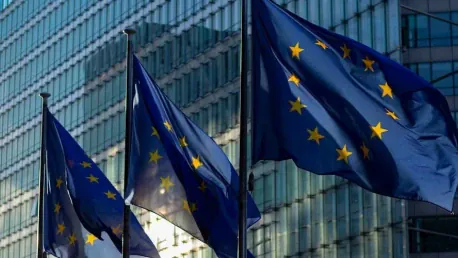The European Commission’s recent unveiling of the Omnibus package marked a significant shift in the regulatory landscape, dramatically altering the Corporate Sustainability Due Diligence Directive (CSDDD) and other sustainability laws. Announced on February 26, 2025, by Commissioner Valdis Dombrovskis, the objective of this package is to cut through bureaucratic red tape to enhance competitiveness amidst an economic slowdown and wavering geopolitical conditions. However, this move has faced harsh criticism, particularly from the International Federation for Human Rights (FIDH). Critics argue that the deregulation initiative goes against strides made in human rights and environmental protections, potentially setting back years of progress.
Detailed within the Omnibus package are key revisions to the CSDDD, including narrowing the due diligence requirements to direct partners only and eliminating civil liability alongside representative judicial actions by NGOs or trade unions. Additionally, the mandate for companies to implement climate transition plans has been removed, weakening the core objectives of the CSDDD and making it considerably more challenging to hold corporations accountable for negative impacts on workers, communities, and the environment. By reducing these stringent requirements, the European Commission aims to provide businesses with greater flexibility, potentially spurring economic growth. However, the trade-off has generated substantial concern about the broader implications for corporate accountability and sustainability.
Corporate Concerns and Stakeholder Exclusion
The process by which the Omnibus package was adopted has also drawn significant criticism, contrasting starkly with the extensive and inclusive negotiations that initially characterized the CSDDD’s development. Consultations were notably limited and invitation-only, with corporate lobbies dominating the discussions while sidelining civil society organizations and trade unions that represent the victims of corporate abuses. This exclusionary approach raised alarms among advocates who believe that the voices of those most affected by corporate misconduct were not adequately heard or considered.
Such a rushed and closed decision-making process undermines the legitimacy and robustness of the policies being enacted. For those businesses and investors who have already made substantial investments to comply with the existing CSDDD framework, this abrupt shift introduces uncertainty and potential financial instability. Companies that have committed to rigorous sustainability standards may now find themselves at a competitive disadvantage for having allocated resources to meet these regulations. This dichotomy not only risks destabilizing the legal framework but also erodes the credibility of the EU as a transparent and consistent regulator.
Broader Implications and Critiques
Furthermore, by undermining an established regulatory structure, the European Union risks jeopardizing its reputation as a global leader in human rights and environmental sustainability. This deregulation is seen by critics as a step back, jeopardizing the EU’s institutional integrity and creating a problematic precedent for future policymaking. Groups such as the European Coalition for Corporate Justice and various French NGOs have voiced strong opposition, highlighting that the Omnibus package represents sweeping deregulation that dismantles essential corporate accountability mechanisms.
The potential long-term implications of this approach are multifaceted. On one hand, it may increase legal uncertainty, resulting in heightened confusion for businesses and reducing protections for individuals and the environment. Essentially, the drive for short-term economic competitiveness could undermine long-term sustainability efforts and public trust in regulatory bodies. The broader sentiment among critics is that this maneuver might diminish the EU’s longstanding commitment to human rights and environmental stewardship, urging a reconsideration and a call for a more balanced approach.
Moving Forward
The European Commission’s recent introduction of the Omnibus package signifies a major shift in regulatory policies, particularly altering the Corporate Sustainability Due Diligence Directive (CSDDD) and other sustainability laws. Announced on February 26, 2025, by Commissioner Valdis Dombrovskis, the package aims to reduce bureaucratic hurdles to enhance competitiveness during economic slowdown and geopolitical uncertainties. However, this initiative has drawn significant criticism, especially from the International Federation for Human Rights (FIDH). Critics argue that deregulation could undermine human rights and environmental protections, reversing years of progress.
The Omnibus package includes significant CSDDD revisions, such as limiting due diligence obligations to direct partners only and removing civil liability and representative judicial actions by NGOs or trade unions. Furthermore, the requirement for companies to implement climate transition plans has been eliminated, diluting the CSDDD’s core objectives. These changes aim to offer businesses more flexibility and stimulate economic growth. However, the trade-off has raised substantial concerns about the broader impact on corporate accountability and sustainability.









